Recovering from an amputation is not just about healing physically—it’s also about finding emotional and mental balance. The changes that come after losing a limb can be overwhelming. You may experience frustration, grief, or even anxiety about the future. These feelings are completely normal, but without the right coping strategies, they can make recovery even harder.
This is where mindfulness and meditation can help. These simple yet powerful practices can reduce stress, improve emotional well-being, and help you reconnect with your body in a new way. By focusing on the present moment, you can learn to manage pain, ease negative thoughts, and build a stronger sense of control over your life.
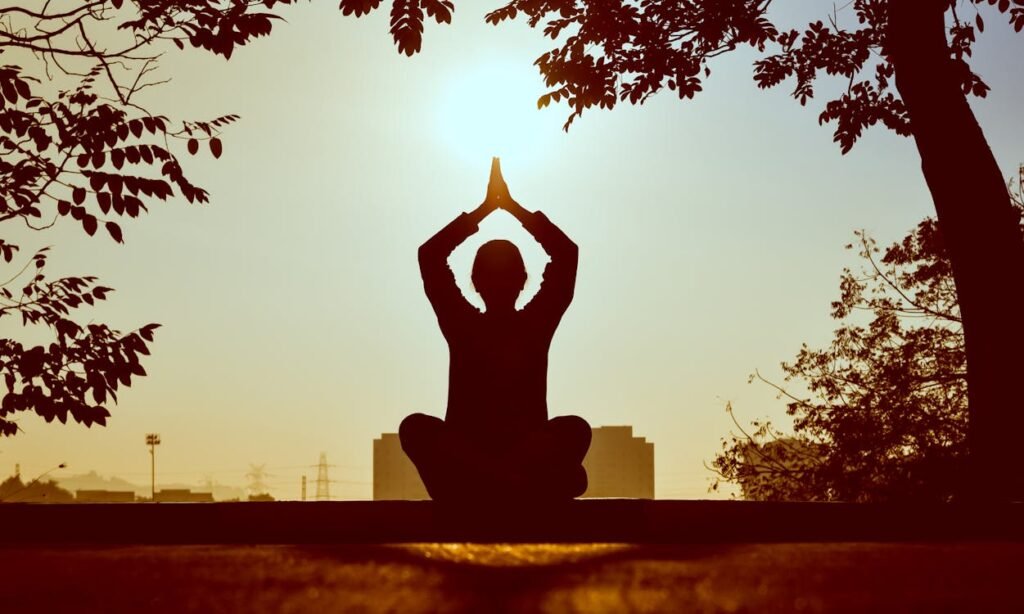
Understanding Mindfulness and Meditation in Recovery
Mindfulness and meditation are more than just relaxation techniques—they are tools that help you reconnect with yourself, manage emotions, and find peace during difficult moments.
When recovering from an amputation, your mind is just as important as your body. How you think and feel affects your healing process, your ability to adapt, and your overall well-being.
What is Mindfulness?
Mindfulness is the practice of being fully present in the moment without judgment. It means noticing your thoughts, emotions, and physical sensations without getting overwhelmed by them.
Instead of focusing on the past or worrying about the future, mindfulness helps you stay grounded in what is happening right now.
For an amputee, mindfulness can be particularly helpful. It can reduce stress, ease frustration, and help you accept your new reality with a clearer and calmer mind. It doesn’t mean ignoring challenges—it means facing them with a sense of awareness and control.
How Meditation Supports Amputation Recovery
Meditation is a focused form of mindfulness that involves sitting quietly, breathing deeply, and allowing your thoughts to settle. It can be done in many ways—through guided meditation, deep breathing exercises, or even simple moments of stillness.
Meditation helps train your mind to handle emotions better, which is crucial when dealing with the ups and downs of amputation recovery.
Many amputees experience phantom limb pain, stress, and anxiety. Meditation has been shown to reduce these symptoms by calming the nervous system and improving mental resilience. When practiced regularly, it can help you regain a sense of balance and strength.
Accepting Change Through Awareness
One of the hardest parts of amputation recovery is adjusting to the changes in your body. There may be moments of sadness, frustration, or anger.
These feelings are valid, but when they become overwhelming, they can slow down your recovery. Mindfulness helps you acknowledge these emotions without letting them take over.
Instead of thinking, Why did this happen to me?, mindfulness shifts the focus to This is my reality, and I can learn to adapt. This change in mindset doesn’t happen overnight, but with practice, it allows you to move forward with greater confidence and acceptance.
At Robobionics, we believe that recovery goes beyond just physical rehabilitation. A clear and focused mind can make all the difference in adapting to life after amputation.
Whether it’s using mindfulness to manage pain or meditation to find inner peace, these practices can be just as important as any prosthetic or therapy session.

Managing Pain and Discomfort with Mindfulness
One of the biggest challenges in amputation recovery is dealing with pain, both physical and emotional. Many amputees experience phantom limb pain—sensations that feel as if they are coming from the missing limb.
Others struggle with nerve pain, discomfort from using a prosthetic, or overall soreness from rehabilitation. While medication and physical therapy play a key role in pain management, mindfulness offers a natural and effective way to cope with discomfort.
Understanding the Mind-Body Connection
Pain is not just a physical sensation—it is influenced by emotions, thoughts, and stress levels. When you are anxious or frustrated, pain often feels worse. The mind and body are deeply connected, meaning that learning to calm your mind can help ease physical discomfort.
Mindfulness teaches you to observe pain without reacting to it with fear or frustration. Instead of thinking, This pain is unbearable, mindfulness encourages a shift to I feel pain, but I can manage it. This change in perspective helps reduce suffering and makes pain more manageable.
Using Mindful Breathing to Reduce Pain
One of the simplest ways to use mindfulness for pain relief is through deep breathing. When pain arises, the body naturally tenses up, making discomfort feel stronger. Taking slow, deep breaths signals the nervous system to relax, which can help reduce pain intensity.
A simple breathing exercise involves inhaling deeply for four seconds, holding the breath for a moment, and then exhaling slowly. Focusing on each breath instead of the pain itself can create a calming effect, helping you feel more in control.
Body Scanning: Noticing Sensations Without Fear
A technique called body scanning can also help reduce pain and discomfort. This involves mentally scanning your body from head to toe, noticing any areas of tension or discomfort without judgment.
Instead of resisting pain, you acknowledge it and allow it to be present without letting it overwhelm you.
For example, if you feel pain in your residual limb, instead of tensing up or worrying about it, you can mentally say, I feel sensation here, and that’s okay. This approach reduces emotional distress around pain, making it feel less intense over time.
Reducing Phantom Limb Pain Through Mindfulness
Phantom limb pain is one of the most mysterious and frustrating aspects of amputation recovery. The brain still sends signals to the missing limb, creating sensations that feel real even though the limb is no longer there.
Mindfulness helps by shifting your attention away from distress and toward acceptance. Instead of fighting phantom sensations, mindfulness allows you to observe them without panic.
Techniques like visualization—where you imagine your missing limb relaxing or stretching—can also help rewire the brain’s response and reduce pain over time.
At Robobionics, we recognize that pain management is a crucial part of recovery. While advanced prosthetics like Grippy™ provide physical support, mindfulness offers a way to heal from the inside out.
Combining both can create a more comfortable and empowering rehabilitation experience.
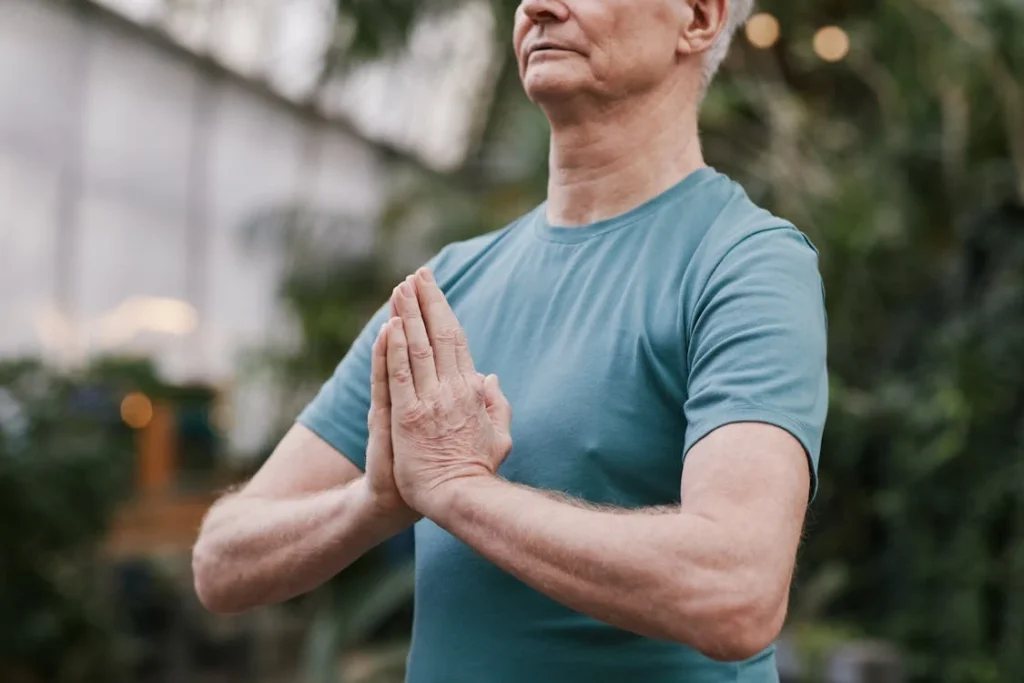
Using Meditation to Overcome Emotional Challenges
The emotional impact of an amputation can be just as difficult as the physical recovery. Many amputees experience a wide range of emotions, including grief, frustration, anger, and sadness.
Adjusting to a new way of living takes time, and it’s normal to feel overwhelmed. Meditation offers a way to process these emotions, regain inner balance, and move forward with strength.
Accepting Difficult Emotions Without Judgment
After an amputation, it’s common to feel like you’ve lost a part of yourself. The changes in your body can affect your sense of identity, making it difficult to accept your new reality. Meditation can help by teaching you to acknowledge these feelings without letting them control you.
Instead of resisting emotions like sadness or frustration, meditation encourages you to sit with them. By taking a few quiet moments each day to close your eyes, breathe deeply, and allow emotions to arise without judgment, you can start to process them in a healthier way.
Over time, this practice helps create emotional resilience, making it easier to handle difficult moments without feeling stuck in them.
Finding Calm Through Guided Meditation
Guided meditation is a great tool for those who are new to meditation. In this practice, a calming voice leads you through a series of relaxing instructions, helping you focus on your breath, body, or positive thoughts.
Many guided meditations are specifically designed for pain management, emotional healing, or stress reduction—areas that are especially important for amputees.
Apps like Headspace, Calm, and Insight Timer offer free guided meditations that can help you practice mindfulness without needing prior experience. Even a five-minute session can help shift your mood and bring a sense of calm.
Visualizing a Stronger, More Confident You
Another form of meditation that can be helpful in amputation recovery is visualization. This involves closing your eyes and picturing yourself moving, adapting, and thriving in your new reality.
The brain responds strongly to imagery, and visualizing success can actually help improve real-world performance.
For example, if you are learning to use a prosthetic, you can visualize yourself using it with ease, walking confidently, or performing daily tasks smoothly.
This technique has been used by athletes, performers, and even surgeons to improve their abilities—showing that the mind has a direct impact on what the body can achieve.

Strengthening the Mind-Body Connection for a Smoother Recovery
Recovery from an amputation is about more than just physical healing—it’s about rebuilding the connection between your mind and body.
After limb loss, you may feel disconnected from your body, struggling with new sensations, phantom limb pain, or the challenge of adapting to a prosthetic.
Mindfulness and meditation can help bridge this gap, creating a sense of harmony between what you feel emotionally and what your body is experiencing physically.
Reconnecting with Your Body After Amputation
It’s common for amputees to feel a sense of detachment from their residual limb or their prosthetic. The brain is adjusting to a new way of functioning, and this transition can sometimes feel unnatural or frustrating.
Mindfulness can help by bringing awareness to your body in a gentle, accepting way.
A simple way to practice this is through body awareness meditation. Find a quiet place to sit or lie down, close your eyes, and slowly bring attention to different parts of your body.
Start with your head and work your way down, noticing any sensations without judgment. When you reach your residual limb or prosthetic, acknowledge any feelings that arise, whether they are discomfort, numbness, or even frustration.
The goal is not to change anything but simply to become aware of what your body is experiencing.
This practice helps rebuild the connection between your brain and your body, making it easier to adapt to your new reality. It can also help ease tension and improve how your nervous system processes pain.
Enhancing Prosthetic Adaptation with Mindfulness
Using a prosthetic for the first time can feel overwhelming. It takes patience and practice to learn how to move naturally, regain balance, and complete everyday tasks. Many amputees experience a learning curve that comes with frustration or self-doubt.
Mindfulness can make this process smoother by helping you focus on each movement with intention. Instead of rushing or getting frustrated, practicing mindful movement can help you develop better control and coordination.
When using your prosthetic, pay close attention to how it feels. Notice the small shifts in balance, the pressure points, and the way your muscles engage.
If something feels uncomfortable, acknowledge it without frustration and make adjustments as needed. By staying present and patient, you can improve your ability to adapt to your prosthetic more naturally.
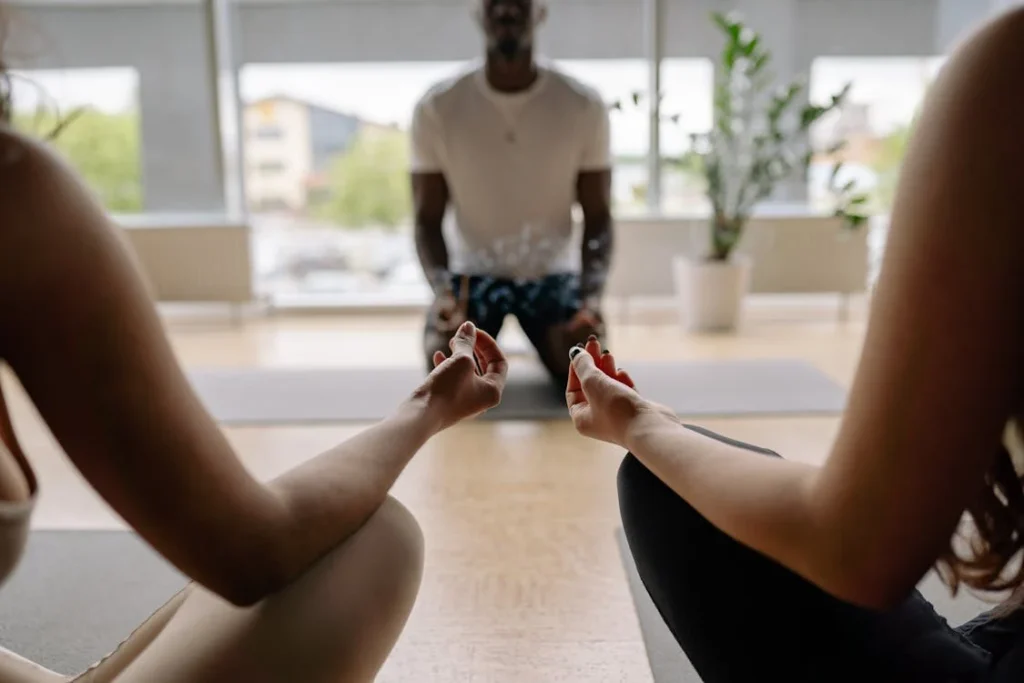
Cultivating a Positive Mindset Through Meditation
The way you think about your recovery shapes your experience. If you approach it with frustration and doubt, every challenge will feel harder. But if you cultivate a mindset of patience and resilience, you will find ways to adapt and thrive.
Meditation is a powerful tool for shifting your mindset, helping you replace self-doubt with confidence and negative thoughts with hope.
Letting Go of Negative Thoughts
After an amputation, it’s easy to focus on what has changed or what feels difficult. Thoughts like I’ll never be able to do things the same way again or People will always see me differently can create mental barriers that hold you back.
Meditation teaches you to observe these thoughts without letting them define you.
One effective meditation technique for this is thought awareness. Sit in a quiet place and close your eyes. As thoughts come to your mind, don’t fight them—just observe them as if they were clouds floating by.
If a negative thought arises, recognize it and let it pass. Over time, this practice helps reduce self-judgment and makes it easier to break free from limiting beliefs.
Using Gratitude to Shift Perspective
Another powerful meditation technique is gratitude meditation. This involves focusing on the things you can do rather than what you’ve lost.
Instead of dwelling on challenges, take a few minutes each day to reflect on something positive—your progress, the support of loved ones, or even a small victory like successfully using your prosthetic in a new way.
Gratitude meditation doesn’t mean ignoring difficulties—it means choosing to recognize the good alongside the struggles. Studies show that regularly practicing gratitude can improve mood, reduce anxiety, and even enhance physical healing.
Building Patience and Self-Compassion
Recovery is not a straight path, and setbacks are normal. Some days will be easier than others, and that’s okay. Meditation helps you develop self-compassion, the ability to be kind to yourself even when things don’t go as planned.
A simple self-compassion meditation involves placing your hand over your heart, closing your eyes, and silently repeating phrases like I am doing my best, I am patient with myself, or I deserve kindness.
This practice can be especially helpful on days when frustration or self-doubt feels overwhelming.
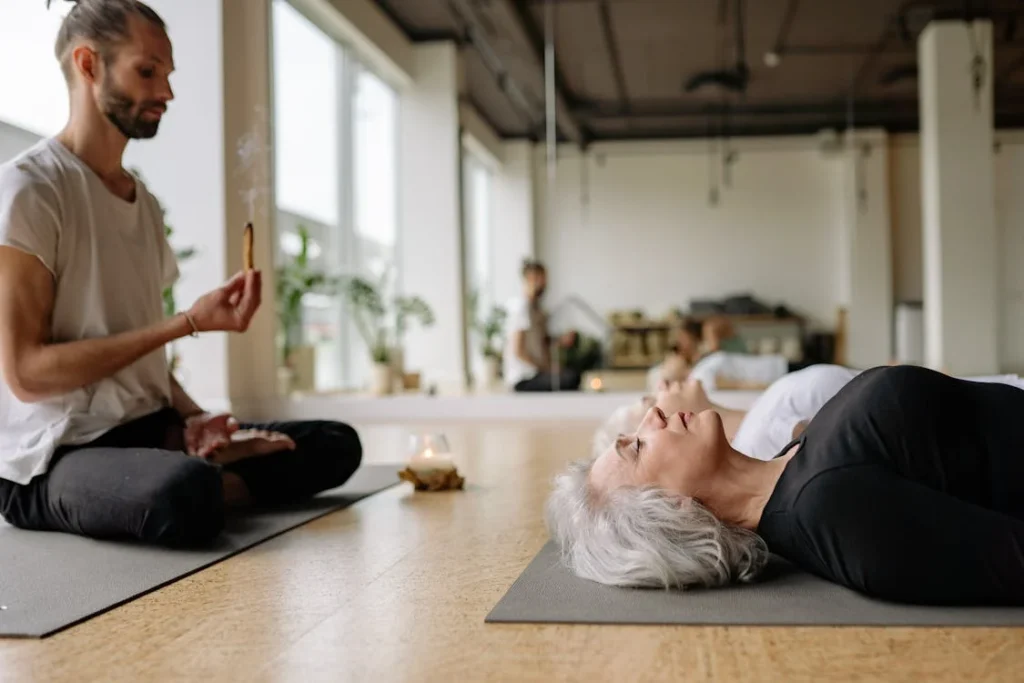
Integrating Mindfulness into Daily Life
Mindfulness and meditation are not just practices you do in isolation—they can become a natural part of your daily routine.
The more you incorporate mindfulness into your life, the easier it becomes to manage stress, handle social interactions, and navigate recovery with confidence.
The goal is to bring awareness into everyday moments, helping you stay present and engaged rather than overwhelmed by worry or frustration.
Mindful Mornings: Setting a Positive Tone for the Day
How you start your day can influence how you feel for the rest of it. Instead of rushing into your routine with stress or negativity, take a few moments in the morning to center yourself.
A simple morning mindfulness practice can include deep breathing, a short meditation, or even just a quiet moment with your thoughts.
Before getting out of bed, take a deep breath and set an intention for the day. It could be as simple as I will approach today with patience or I will focus on what I can do, not what I can’t.
If you wear a prosthetic, take your time putting it on with awareness. Notice how it feels, how your body adjusts, and how it supports you. By starting your day with mindfulness, you create a sense of control and stability.
Bringing Awareness to Daily Activities
Mindfulness isn’t just about sitting quietly—it can be practiced during any activity. Whether you are eating, walking, or even using your prosthetic for a task, paying full attention to the moment can enhance your connection with yourself.
For example, if you are eating, focus on the taste, texture, and experience of your food instead of eating quickly or thinking about something else.
If you are walking, notice how your body moves, how your prosthetic feels, and how your balance shifts. By fully engaging in daily tasks, you train your mind to be present rather than lost in worry.
Using Mindfulness During Rehabilitation and Therapy
Physical therapy and rehabilitation exercises can sometimes feel repetitive or frustrating. It’s easy to focus on what’s difficult rather than appreciating the progress you are making. Practicing mindfulness during rehab can help you stay patient and motivated.
Instead of pushing through exercises mindlessly, pay attention to each movement. Notice how your muscles engage, how your body adjusts, and how your strength improves over time.
If frustration arises, acknowledge it without letting it take over. Remind yourself that every small effort contributes to long-term progress.
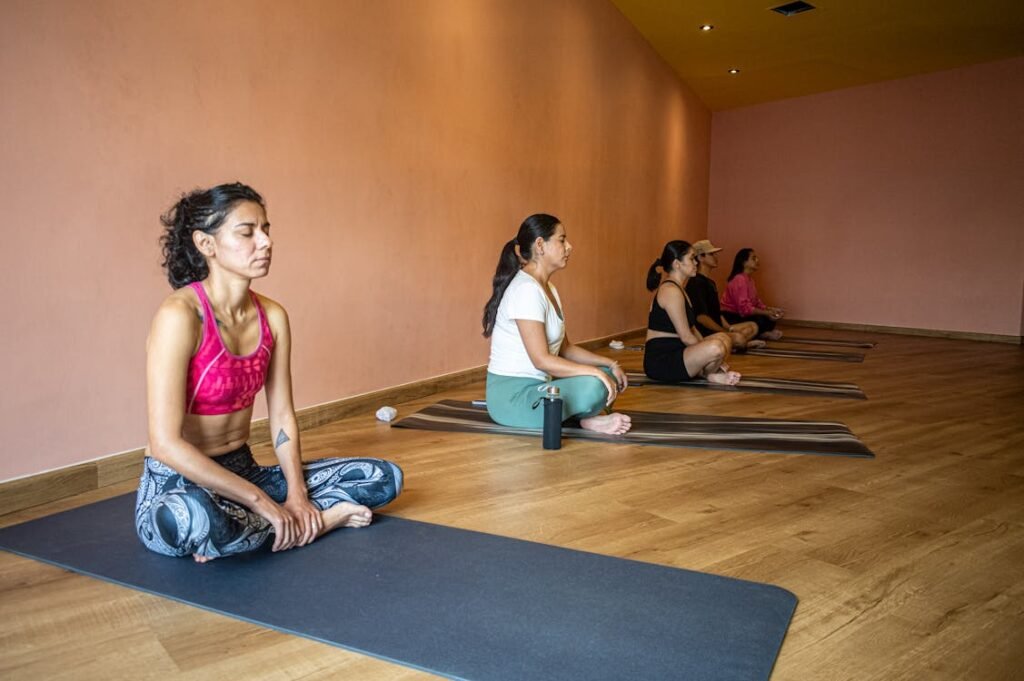
Strengthening Emotional Resilience Through Mindfulness
Recovery from an amputation is not just about physical healing—it’s also about building emotional strength. There will be good days when you feel hopeful and confident, and there will be difficult days when frustration, sadness, or self-doubt take over.
Mindfulness helps you navigate these emotions without letting them control your recovery.
Accepting Ups and Downs Without Judgment
It’s natural to experience a range of emotions after an amputation. Some days, you may feel strong and capable, while other days, you may feel discouraged.
The key to emotional resilience is not forcing yourself to be positive all the time but learning to accept emotions as they come.
Instead of thinking, I shouldn’t feel this way or I need to get over this, mindfulness encourages you to acknowledge your emotions without judging them. If sadness arises, notice it: I am feeling sad right now, and that’s okay.
If frustration appears, recognize it without letting it overwhelm you. By allowing emotions to exist without fighting them, they often lose their intensity and become easier to manage.
Responding to Stress with Calmness
Stress is a natural part of recovery, but how you respond to it can make a big difference.
When faced with a stressful situation—whether it’s learning a new skill with your prosthetic, handling social interactions, or managing medical appointments—mindfulness helps you stay calm and in control.
One effective technique is the 5-4-3-2-1 grounding exercise. If you feel anxious, pause and focus on:
- 5 things you can see
- 4 things you can touch
- 3 things you can hear
- 2 things you can smell
- 1 thing you can taste
This simple practice brings you back to the present moment, stopping anxious thoughts from spiraling. The more you use mindfulness in moments of stress, the more natural it becomes to respond with calmness instead of panic.
Finding Joy in Small Moments
When going through a major life change, it’s easy to focus on what’s difficult and overlook the small joys. Mindfulness encourages you to slow down and appreciate the little things—a warm cup of tea, a kind conversation, a moment of progress in physical therapy.
These small moments add up, creating a sense of gratitude and positivity that supports emotional healing.
Keeping a mindfulness journal can help you shift your focus toward the positive. Each day, write down one thing that made you feel good, no matter how small. Over time, this practice helps rewire the brain to notice and appreciate the good in life, even during challenging times.
Conclusion
Mindfulness and meditation are powerful tools that can support your amputation recovery, helping you manage pain, reduce stress, and build emotional resilience. By staying present, accepting your emotions without judgment, and practicing self-compassion, you can navigate this journey with greater ease and confidence.
Recovery is not just about physical adaptation—it’s about strengthening the mind-body connection and finding a sense of peace within yourself. Whether you use mindfulness during daily activities, rehabilitation exercises, or moments of stress, each practice helps you regain control and feel more empowered in your new reality.
At Robobionics, we understand that healing goes beyond prosthetics. While our advanced solutions like Grippy™ restore function, mindfulness helps restore balance, making the journey smoother and more fulfilling. If you’re looking for a prosthetic that supports both physical and emotional well-being, book a free demo today and take the next step toward a confident and independent future.



